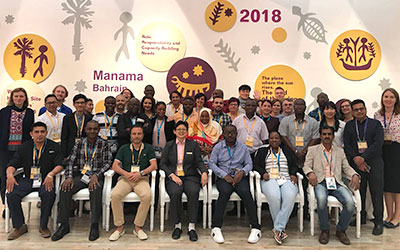- Start date: 21 June 2018
- End date: 28 June 2018
- Location: 42nd World Heritage Committee, Manama, Bahrain
- Number of Participants: 44
- State Parties: 33
Executive Summary
Through the WHL programme, ICCROM co-organized the second edition of the Site Managers’ Forum together with the Kingdom of Bahrain, in cooperation with the UNESCO World Heritage Centre, ICOMOS, IUCN, and the National Heritage Board of Poland.
The theme of the eight-day forum was “Roles, Responsibilities and Capacity-Building Needs.” After five days of lectures, group work, discussions and networking, participants also attended the plenary session of the World Heritage Committee for three days. They observed how the committee makes decisions on the state of conservation of World Heritage sites.
The forum produced the “Statement of Participants: Recognition and Inclusion”, presented during the plenary session of the committee. As professionals working directly on the sites, the managers noted the similarity of their role as coordinators of management systems and the daily challenges and responsibilities they faced, regardless of the type and size of the heritage.
Their forum statement highlighted the importance of recognizing the site management “team”, together with their collective roles and responsibilities, as an important step in understanding the complexity of heritage management. The statement also emphasized the importance of involving and including site managers and coordinators into the decision-making procedures of the World Heritage Convention, as it is the site managers and coordinators who are ultimately responsible for putting in place the actions requested by the committee. The statement is provided as Annex 7 of this report.
It was observed that several of the participants acquainted from the forum engaged in more in-depth communication and relationships with their peers, including inviting each other to their respective symposium/events that they organize. More than six months after the event, participants continued to communicate actively through a WhatsApp group created voluntarily by them.

